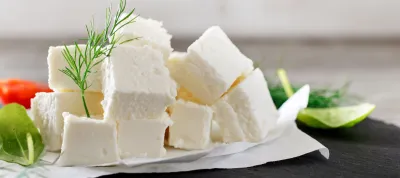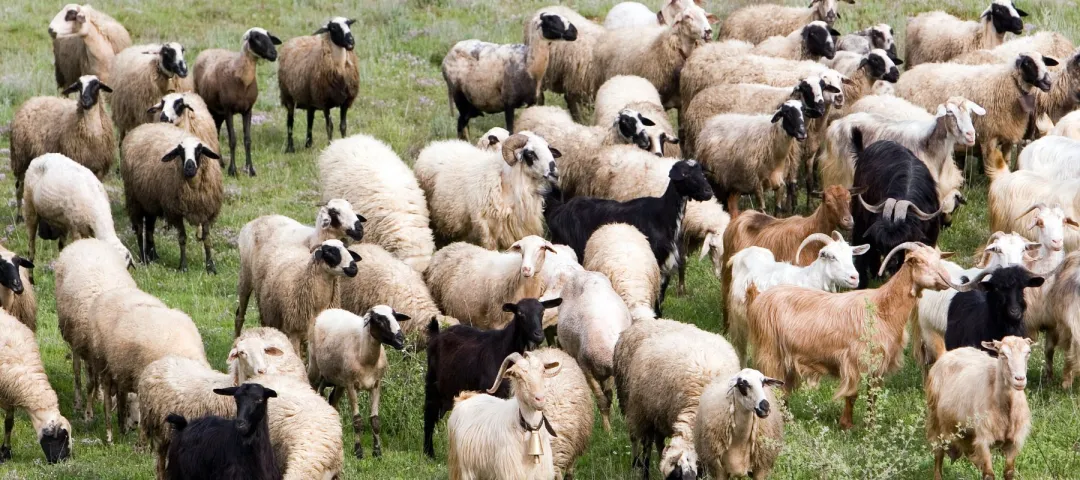General information
RDP Priority
- P3. Food chain and risk management
RDP Focus Area
- 3A: Agri-food chain integration & quality
RDP Measure
- M04: Investments in physical assets
Beneficiary type
- Small-Micro Enterprise
Summary
CAP funds for Greece helped the Viozokat SA animal feed company to expand and improve competitiveness by investing in a modernisation project. The company specialises in feed for goats and sheep, supplying milk for feta cheese producers.
Manufacturing capacity increased by 20% thanks to CAP support, and the modernised production facilities allow the manufacturing company to enhance efficiency, ensuring that they can meet the growing requirements of farmers who are increasingly focused on optimising their livestock’s health and productivity. Additionally, advances in digitalised technology funded by the project facilitate traceability and formulations of feed that are tailored to specific nutritional needs, further supporting animal welfare and productivity.
These modernised facilities also contribute to environmental sustainability by implementing state-of-the-art energy solutions and minimising the ecological footprint of feed production.
Costs covered new roofing, solar power, a steam boiler, improved storage and packaging, new premix line, and digitised traceability systems.
Results
Project benefits included:
- new production possibilities for high value-added products (new pellet-type feed products), recognisable and attractive to the consumer;
- integration of advanced technology and environmentally friendly processes that reduce climate change risks;
- increased storage capacity of the plant by 10 000 tonnes;
- conservation and creation of company jobs (with modernised occupational health protection and better conditions). The company has planned for 2.1 new annual employment units. Half of the new jobs will consist of graduates of higher education institutions;
- farmers now have access to better feed products and improved customer service;
- engineers and the logistics department work more efficiently with fewer errors or delays;
- grain farm suppliers can secure three years of contracts.

Promoter
Viozokat SA
Funding
Total budget 6 364 600 (EUR)
RDP support: 3 500 530 (EUR)
Private/own: 2 864 070 (EUR)
Keywords
Resources
Documents
Context
In a context of increasing global demand for sustainable and efficient food production systems, the modernisation of production facilities for animal feed manufacturers catering to sheep and goats in Europe is beneficial for several reasons. First, the demand for high-quality livestock products is strong due to consumer preferences shifting towards sustainable and ethically produced food.
Modernising feed production facilities allows manufacturers to enhance efficiency, ensuring that they can meet the growing requirements of farmers who are increasingly focused on optimising their livestock’s health and productivity. Additionally, advances in technology can lead to improved formulations of feed that are tailored to specific nutritional needs, further supporting animal welfare and productivity.
Modernised facilities can also contribute significantly to environmental sustainability, e.g., by implementing state-of-the-art technologies such as solutions reducing resource consumption and minimising the ecological footprint of feed production. By adopting these innovations, manufacturers not only comply with European safety standards regarding environmental impact, but also position themselves as leaders in sustainable practices within the agricultural sector. Modernising production facilities can thus help enable sheep and goat feed manufacturers in Europe to thrive economically while contributing positively to animal welfare and environmental sustainability.
Viozokat SA is a Greek animal feed firm founded in 1966 with nutrition specialisms for sheep and goats supplying milk for feta cheese producers. The company has been expanding, and it applied for CAP funds to help modernise its production potential.
Objectives
The company’s expansion plans set out to:
- increase productivity by boosting capacity by 20%;
- increase storage capacity;
- produce more efficiently and faster to improve customer experiences;
- provide lifecycle traceability for the final product;
- achieve digital transformation and minimise error risks in production procedures;
- support local farmers;
- promote the raw material quality of a feta cheese PDO product;
- cover the full range of animal feed nutrition.
Activities
This animal feed investment project involved the following main works:
- upgrade the previous mill with 5400 m2 of new roofing to protect product quality and safeguard a stable temperature for staff;
- install 750kw of solar panels to help power the factory and be eco-friendly;
- replace a petrol boiler with a steam boiler to further reduce cost and energy waste;
- complete digitalisation of production procedures and logistics, enabling customers to track the raw material inputs of products;
- install new equipment with double packaging possibilities;
- replace 12 storage silos with 13 new ones;
- establish a new premix line to encourage company autonomy in vitamins while still covering a wide range of animal nutrition needs.
Main results
Results from the project activities included:
- new production possibilities for high value-added products (new pellet-type products), recognisable and attractive to the consumer;
- increased storage capacity of the plant by 10 000 tonnes;
- integration of advanced technology and environmentally friendly processes that reduce climate change risks;
- conservation and creation of company jobs (with modernised occupational health protection and better conditions). The company has planned for 2.1 new annual employment units. Half of the new jobs will consist of graduates from higher education institutions;
- farmers have access to a better feed product with better customer services;
- grain farm suppliers can secure 3 years of contracts;
- engineers and the logistics department work more efficiently with fewer errors or delays.
Key lessons
Key features of the project that can be adapted and replicated to ensure success are:
Sustainable Sourcing of Ingredients.
- Use locally available raw materials to reduce costs and support local agriculture.
- Include alternative, sustainable ingredients such as insects, algae, or food waste by-products.
Research and Development.
- Adapt feed formulas to meet the specific nutritional needs of animals in the region.
- Implement rigorous testing protocols to ensure the feed meets safety and quality standards.
Environmental Sustainability.
- Employ eco-friendly practices in the production process, such as recycling waste products.
- Focus on reducing the carbon footprint of feed production and distribution.
Monitoring and Evaluation
- Establish monitoring and evaluation mechanisms to continuously assess the project’s impact and make necessary adjustments.
By implementing these features and following these steps, an animal feed project can be successfully adapted to various regions, addressing local needs and contributing to sustainable agricultural practices globally.
"It was the largest project that has taken place in the factory the past 30 years, a dream came true. Teamwork through the departments was the most important lesson we have learned. Always focus on the goal to overcome all the difficulties through the procedure. Make every day small steps and encourage people with a positive attitude to continue their work because it means a lot for the company."
Triantafyllou Alexandros

